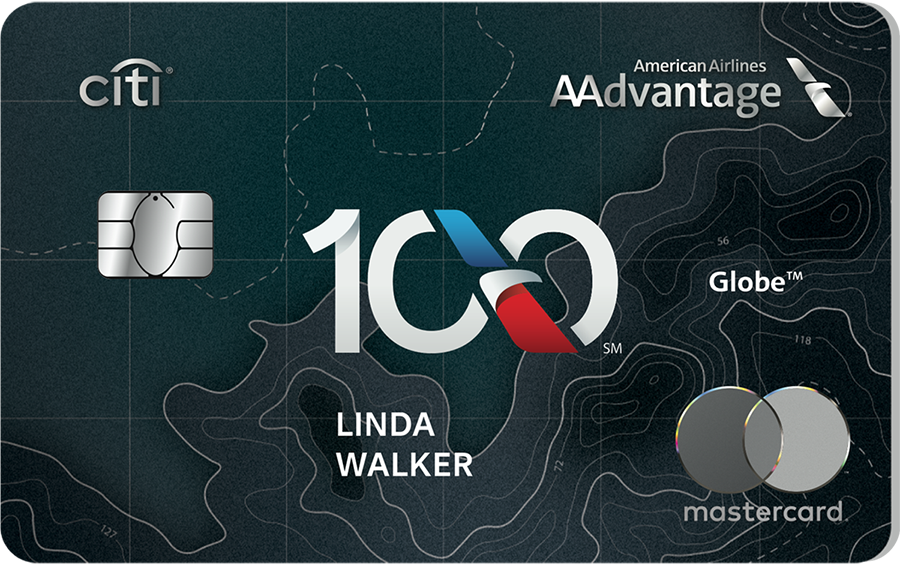Airline Miles Rewards Credit Cards
Airline miles rewards credit cards allow you to turn all your everyday spending into free travel rewards! Air miles points are awarded on purchases bought with the air mile credit card - these air miles points can then be redeemed for free travel including flights, holidays, and hotel stays. Want a credit card that earns airline miles? Find out which airline points credit card gives the most air miles, offers bonus miles, and has rewards. Browse our list of airline miles credit cards from our Advertisers and apply online. For those interested in maximizing the benefits of all their cards, including rewards programs, our guide on Maximizing Your Credit Card Rewards and Benefits offers more options.
Citi® / AAdvantage® Globe™ Mastercard®

- For a limited time, earn 90,000 American Airlines AAdvantage® bonus miles after $5,000 in purchases within the first 4 months of account opening.
- American Airlines AAdvantage® bonus miles are not available if you have received AAdvantage® bonus miles for a new AAdvantage® Globe™ account in the past 48 months or if you converted another Citi credit card account on which you earned a new account bonus in the last 48 months into a AAdvantage® Globe™ account.
- Every calendar year, receive four Admirals Club® Globe™ Passes.
- Global Entry® or TSA PreCheck® application fee credit of up to $120 every 4 years.
- Earn 6 AAdvantage® miles for every $1 spent on eligible hotels booked through aadvantagehotels.com.
- Earn 3 AAdvantage® miles for every $1 spent on eligible American Airlines purchases.
- Earn 2 AAdvantage® miles for every $1 spent at restaurants, including takeout and delivery.
- Earn 1 AAdvantage® miles for every $1 spent on all other purchases.
Choosing Which Airline Miles Credit Card That Is Right For You
Which credit card offers air miles? - First, you should find which credit cards offer air miles. Make a list of the cards you are interested in. Since everyones personal needs differ, you should examine your personal travel frequency and spending habits to determine which card is best suited for you.Found this guide helpful? Bookmark it for future reference as you continue your financial journey!
Experian Boost: A Comprehensive Guide to Boosting Your Free Credit Score
FICO® Credit Scores
FICO® Score Ranges:
- Exceptional: 800–850
- Very Good: 740–799
- Good: 670–739
- Fair: 580–669
- Poor: 300–579
What is a Credit Score?
A credit score is a three-digit number, typically ranging from 300 to 850, that predicts your creditworthiness—how likely you are to repay borrowed money on time. Lenders use this score to assess the risk of lending to you and to determine the interest rates and terms of any credit you might receive.
Why is a Credit Score Important?
A credit score is important because it acts as your financial reputation. Lenders, landlords, insurers, and employers use this single number to quickly judge how reliable you are with money. A higher score helps you qualify for loans and credit cards, often securing lower interest rates that can save you significant money. Conversely, a poor credit score can lead to application denials or much higher costs for borrowing, making it a key factor in your overall financial opportunities.
FICO® Credit Score Facts
- Three-Digit Number: Like other credit scores, FICO® Scores are a three-digit number that summarizes a consumer's credit risk.
- Range: Most standard FICO® Scores range from 300 to 850. Higher scores indicate lower credit risk.
- Data Source: FICO® Scores are calculated using data from your credit reports maintained by the three major credit bureaus: Experian, Equifax, and TransUnion. Your score may vary slightly depending on which bureau's data is used.
- Industry Standard: Lenders rely on FICO® Scores for mortgages, auto loans, and credit cards because they provide a consistent, statistically sound assessment of the likelihood that a borrower will repay their debt.
Note: Credit scores are used to represent the creditworthiness of a person and may be one indicator to the credit type you are eligible for. However, credit score alone does not guarantee or imply approval for any credit card product.
